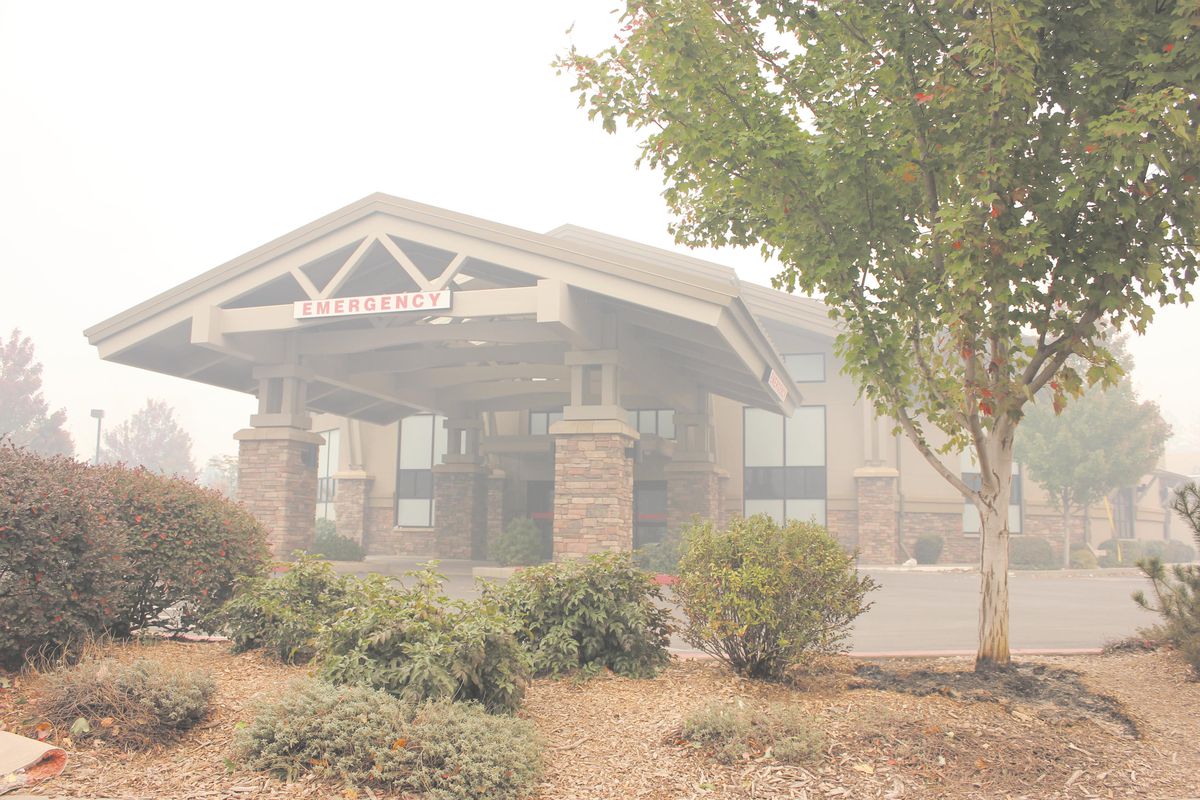
CN&R file photo
Adventist Health Feather River’s emergency room, shown Nov. 9, may get a temporary dispensation to reopen without the hospital operating fully.
As the town rebuilds, Paradise Mayor Jody Jones has heard an array of concerns from residents assessing what the community needs. Foremost are the basics of existence—housing, safe water—but her constituents also talk about access to health care.
Six months ago, on Nov. 8, the Camp Fire blew through Adventist Health Feather River Hospital en route to destroying 90 percent of Paradise. Portions of the Pentz Road campus didn’t survive; many hospital buildings remained standing but suffered damage. Feather River closed for just the second time in its 68-year history; still shuttered, most of its affiliated physicians left the area (see “Medical migration,” Cover story, March 14). Adventist Health—the Ridge’s largest employer before the fire—laid off 798 of 1,205 employees and has not committed to reopening the hospital.
In conversations and at public meetings, Jones told the CN&R, Paradisians have expressed the importance of addressing medical services in the town’s planning process.
“I can’t say it’s on the top of people’s minds right now, but it’s on the list of things that they’re looking for to be able to come back, rebuild and live in Paradise,” Jones said by phone. “Most people do not want to live in a town where there are no medical services.”
Adventist Health did reopen the Feather River Health Center, a clinic building on lower Skyway. It offers primary care, a pharmacy and certain specialists.
However, there’s no emergency room—nowhere for people to go, 24/7, whatever their medical and financial condition. For life-or-death situations, time is of the essence. Ambulances must take patients off the Ridge—to Enloe Medical Center (16 miles from centrally located Paradise High) or Oroville Hospital (21 miles)—instead of to Feather River (3.5 miles). Jones said that “it is very important” to have critical care in the immediate vicinity.
State Sen. Jim Nielsen feels the same way. A Republican whose district includes Butte County, Nielsen has visited the burn zone repeatedly and, like Jones, spoken with constituents. An emergency room may not be the first thing they mention, he said, but its absence is conspicuous.
“From the moment the fire started, we began assessing courses of action each step along the way,” Nielsen said by phone from Sacramento. “When that hospital was hit, then we knew that we were going to be having to do something about it—to try to save some service up there on the Ridge.”
Toward that end, Nielsen authored Senate Bill 156. Co-authored by Assemblyman Jim Gallagher, Nielsen’s bill would revise the state’s Health and Safety Code to allow Adventist Health to operate an emergency room in Paradise without a full hospital. The state would grant a two-year special permit with the potential for two renewals, totaling six years. The bill applies only to Adventist Health and Paradise.
“This is needed,” Nielsen said. “Even the [California] Hospital Association is very supportive of it. We’ve narrowed it, so we’re not making it a precedent or applicable to anything other than this very limited circumstance, so I don’t think we’re going to have any trouble with it.”
SB 156 passed unanimously in the Senate Health Committee late last month and awaits action by the Appropriations Committee, which meets Monday (May 13). The committee could forgo a hearing and send it straight to the full Senate.
“The goal is to get this done quickly and get some service up there,” Nielsen added.
Adventist Health, which sponsored the bill, is not rushing to reopen. Feather River’s parent organization, headquartered in Roseville, told the CN&R via written responses to questions that adoption of SB 156 “[would] enable Adventist Health to explore the option of possibly providing emergency care services in Paradise.”
If Adventist Health moves forward, it “will consider the former Emergency Department” at the Pentz Road campus but may select another location. A helicopter pad would be a decision point.
For support services, “the site could include its own diagnostic equipment, including full radiological facilities, CT scanners and ultrasonography equipment, which are needed for rapid diagnostics. It may also have lab services, which can support providers in obtaining blood counts, blood typing and critically important toxic screenings.”
The license framework, two to six years, “allows Adventist Health to consider opening [e]mergency services while it continues to assess the next steps in the longer term recovery efforts.”
With all this uncertainty, the organization offered no timetable for opening an emergency room.
Dr. Richard Thorp, an internal medicine physician who’s president of Paradise Medical Group, expressed disappointment in the apparent lack of urgency but said he understands the hesitancy. Now based in Chico, his practice just reopened an office PMG renovated at its fire-damaged site. He’s been on the hospital’s medical staff for 38 years, serving 20 on its executive committee.
“They are being careful about what they’re promising,” Thorp said by phone. “They don’t want to overpromise and underdeliver.”
From the business side, he said he appreciates the risk of investing heavily in a place with an uncertain population.
“But there’s a community perspective, like a chicken before the egg kind of thing,” Thorp added. “If somebody goes in, plants a flag and says, ‘We’re going to be here, we’re going to provide a service here so that there’s going to be care for this community,’ that’s going to give people confidence to come back and re-establish.”
